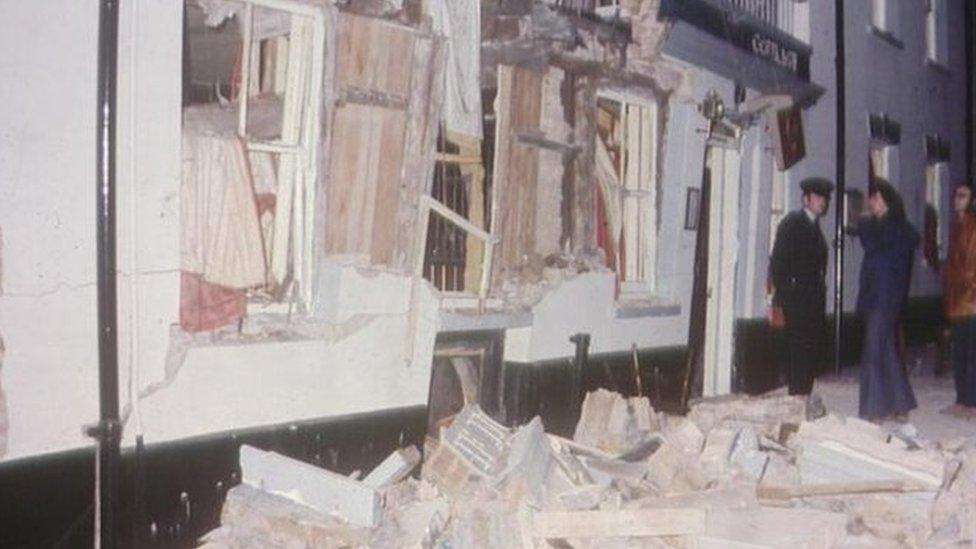Guildford pub bombs inquest: What have we learned?
- Published
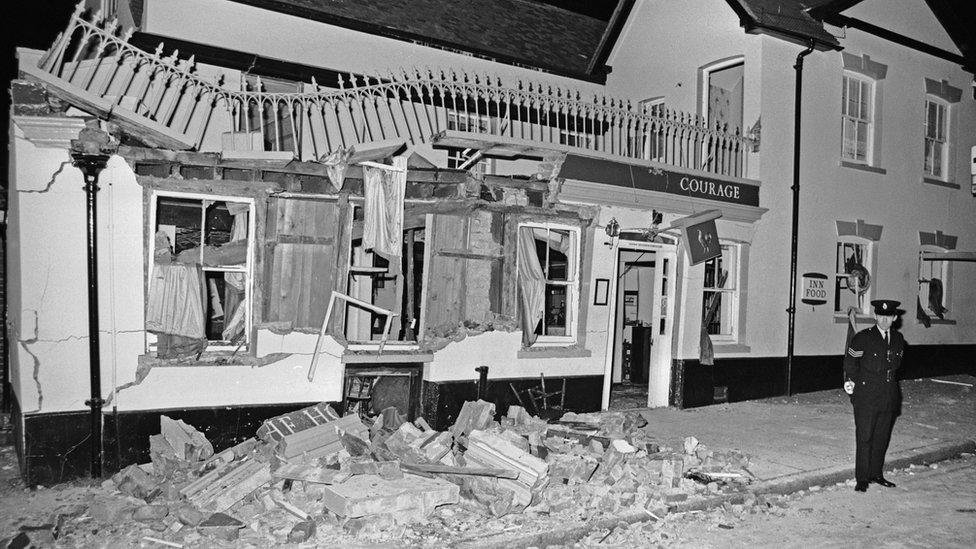
The IRA later admitted responsibility for the explosions
The Guildford pub bombings in 1974 killed five and injured 65 and led to one of Britain's biggest miscarriages of justice when the Guildford Four and Maguire Seven were jailed. An IRA unit later said it had carried out the attacks. Nearly 50 years on, what have we learned from a resumed inquest?
Escalating IRA campaign
IRA targets included the military.
Historian Professor Thomas Hennessey agreed how the Guildford bombs were part of an escalating terror campaign in England, where targets included soldiers. He said intelligence was increasing in sophistication.
A stick of dynamite thrown into tents at Pirbright army camp, near Guildford, in 1973 was an early attack against a military target.
The next significant attack came with the M62 coach bombing in Yorkshire, in February 1974, where nine soldiers, an army wife and two children were killed.
Pubs in Guildford were surrounded by army camps and popular with recruits. Prof Hennessey confirmed this would have made them attractive targets for the IRA.
Four of the five who died were soldiers.

Caroline Slater, 18, Ann Hamilton, 19, William Forsyth, 18, John Hunter, 17, and plasterer Paul Craig, 21, died in the first explosion at the Horse and Groom
Pirbright party night
The night of the bombings was the first night out for many recruits.
The Scots Guards spent their first three weeks of training confined to camp at Pirbright. Members of the Women's Royal Army Corps also had to stay on camp for some initial training.
A police report compiled after the bombings revealed Saturday 5 October had seen "a considerable influx of military personnel into the town". At about 20:30, around 200 further servicemen arrived by train.
The Aldershot military police despatched patrols to Guildford, and the Surrey police presence was also increased.
Army camp security
Defence documents referred to a "Bikini" security alert system used by the army.
A map of Aldershot barracks had been produced by a deserted soldier suspected of terrorism, but the alert was not raised at a meeting on 23 May 1974, the inquest heard.
Some ex-soldiers remembered being told not to go out of camp in uniform in case they were identifiable - but several said personnel would be recognisable anyway, just by their appearance and bearing.
There were mixed accounts of security information displayed at army bases and whether training was delivered on any IRA threat.
As the inquest concluded, the coroner said any lack of training did not cause or contribute to any of the deaths.
He said there were more experienced military personnel in the pub that night, he did not hear evidence supporting a finding that additional training could or would have led to the detection of the terrorists or the bomb, and strangers and bags of unknown ownership were commonplace in pubs.
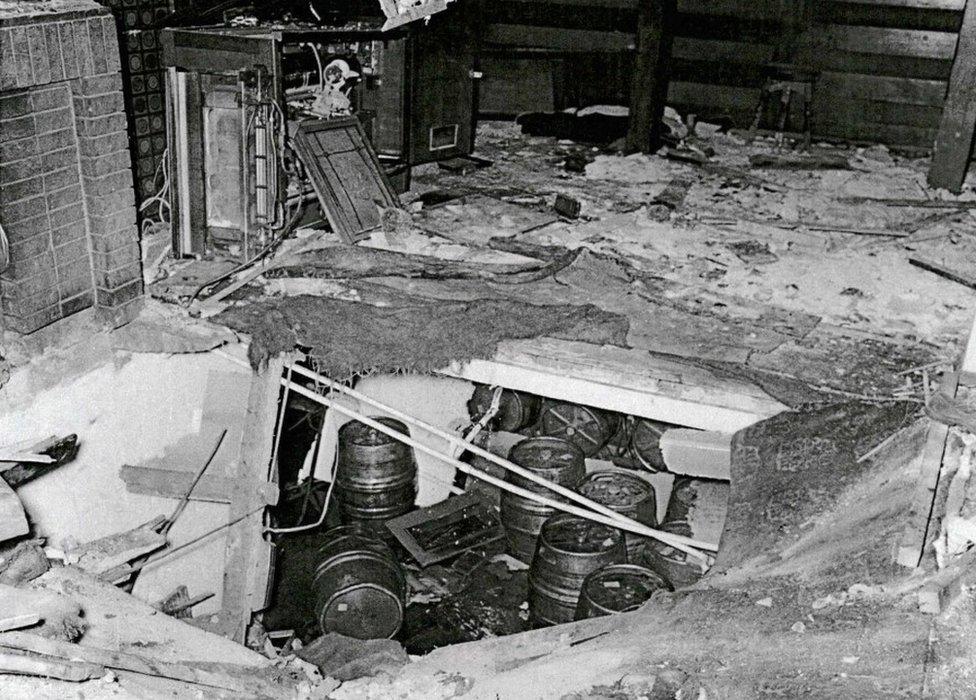
Victims were found in the cellar among stored barrels and debris
'A flash then darkness'
Former soldiers who were in the pub when the bomb went off remembered a flash, then darkness, along with dust, smoke and a smell - described as singeing, burning and chemical.
Some said their first thought was to "get out". Some spoke of a fear there might be a second device in the pub.
Rowland Rehill had left the Horse and Groom and was in the Three Pigeons pub when he heard the blast. The inquest heard he looked at his watch and said: "It's 20:50 exactly."
Cellar trauma
The bomb blew a hole in the floor, exposing the cellar.
The injured and dying were found lying among the debris and the beer barrels, where they had fallen.
Many of the injuries they had were too graphic to be reported.
Ex-Surrey Police officers described looking down to see "a pile of bodies". Fireman Andrew Saunders helped to move four people on to stretchers before they were passed up through the crater.
Only one of the five who died, William Forsyth, made it to hospital alive.
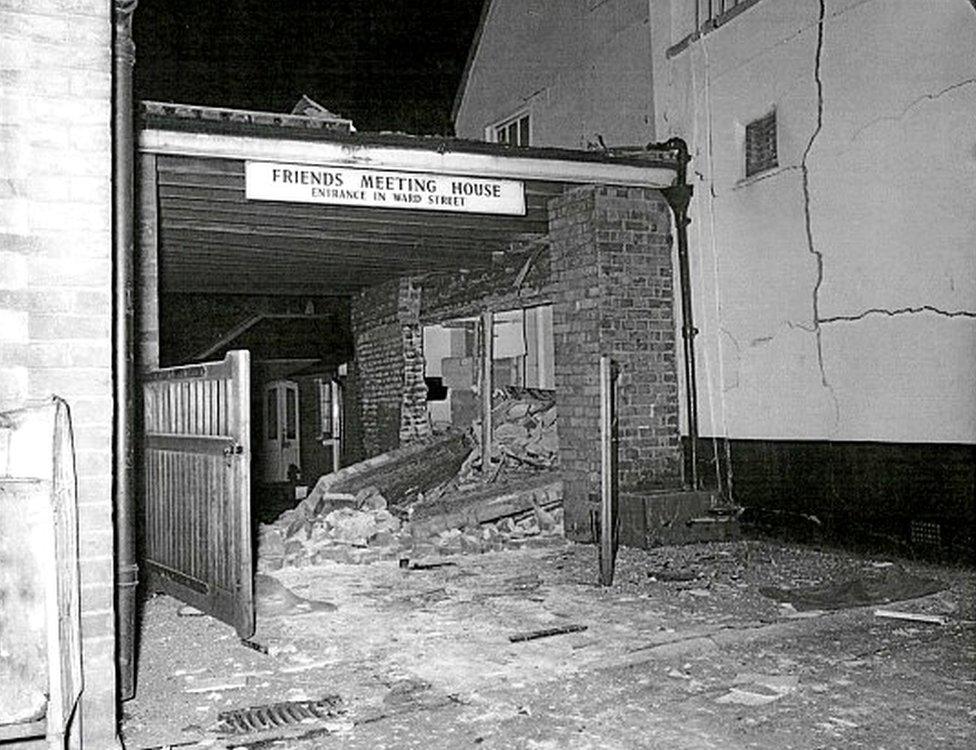
The inquest heard a brick wall that was part of an extension to the pub collapsed into the neighbouring car port, allowing gas from the bomb blast to escape
Gas alert
The chief constable thought it was a gas explosion until a second bomb went off at the Seven Stars pub nearby.
Jeremy Spindlove, ex-Surrey Police officer, remembered a conversation outside the Horse and Groom after the pub had been cleared of people.
He said: "I remember standing in North Street on the main street there and Sir Peter Matthews, the chief constable, was there, and he made a comment, 'well, we definitely think it's a gas explosion'.
"And my recollection is that after that, like seconds later, we heard the explosion down the street at the Seven Stars."
Patched-up pub
A wall collapsed - but it could have prevented further injuries.
The Horse and Groom, which had been made to look like a riding stable inside, with partitions made of tongue and groove boards, had undergone extension work.
The inquest heard when the bomb detonated, a brick extension wall was blown out and completely destroyed. However, pillars and concealed steel joists had also strengthened it.
Oliver Sanders, counsel to the inquest, questioned whether it was "fortuitous" that the building was not so weak it collapsed, but was not so strong that it contained the blast pressure, potentially injuring more people.
The pub had been shored up by the time Home Secretary Roy Jenkins visited the next day.
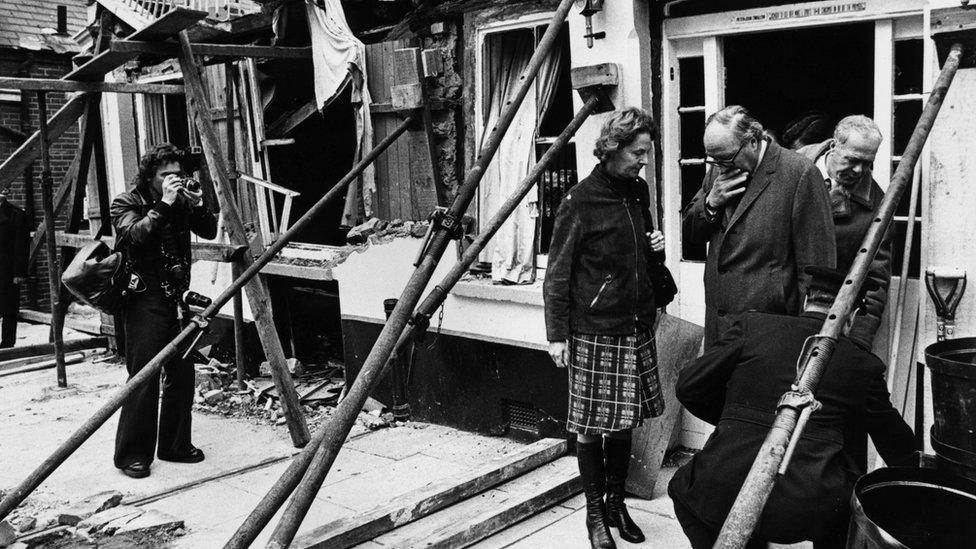
Home Secretary Roy Jenkins visited the shored-up Home and Groom after the bombing
Smith's pocket watches
Several IRA bombs contained timers made from Smith's watches and the inquest heard scientist Douglas Higgs linked together such attacks at the time.
A fragment of what appeared to be from a Smith's watch was found at the scene.
Scientists at the time suggested a watch had been modified to act as an electromechanical timer, Porton Down expert Lorna Hills told the inquest.
The inquest heard Smith's pocket watches, which were more like a stop watch than a wristwatch, were easy to buy in Woolworths.
The coroner said the absence of shrapnel or surviving fragments of a container indicated the bomb was not held in a metal container or packed with bolts, nails or other debris, but was likely to have been carried in a small to medium-sized bag or daysack, or as a parcel.
'Courting couple'
Everyone in the Horse and Groom and Seven Stars between 17:30 and 19:30 was identified "with the exception of a young man and woman in the Horse and Groom, and two men and a woman in the Seven Stars".
The majority of people in both pubs after 19:30 were also identified, the inquest was also told.
But two ex-soldiers who got to the Horse and Groom after 20:00 were asked if they remembered anything suspicious.
Caroline MacRae remembered "a woman staring at us for some reason, I don't know why". She also remembered a green plastic carrier bag by the juke box.
Marion Prescott, who grew up in Belfast where her department store job involved checking bags, also said she remembered the bag and the woman, who, she recalled thinking, "must be very warm in the coat that she was wearing". She said: "Thinking back now, I feel I should have paid a little more attention."
The inquest heard that police in 1974 took statements and asked further questions about the woman and carrier bag, which was thought to belong to a man in the pub.
However, giving his conclusions, coroner Richard Travers said the bomb was probably planted by a young man and woman who, over the years, have been referred to as a "courting couple".
Mr Travers said: "I have found it likely that the bomb was planted by a 'courting couple' as referred to by a number of witnesses. Given that two bombs were planted in two pubs in tandem it is, of course, likely that the overall conspiracy involved more than just two individuals."

Follow BBC South East on Facebook, external, on Twitter, external, and on Instagram, external. Send your story ideas to southeasttoday@bbc.co.uk.
Related topics
- Published1 July 2022

- Published29 June 2022
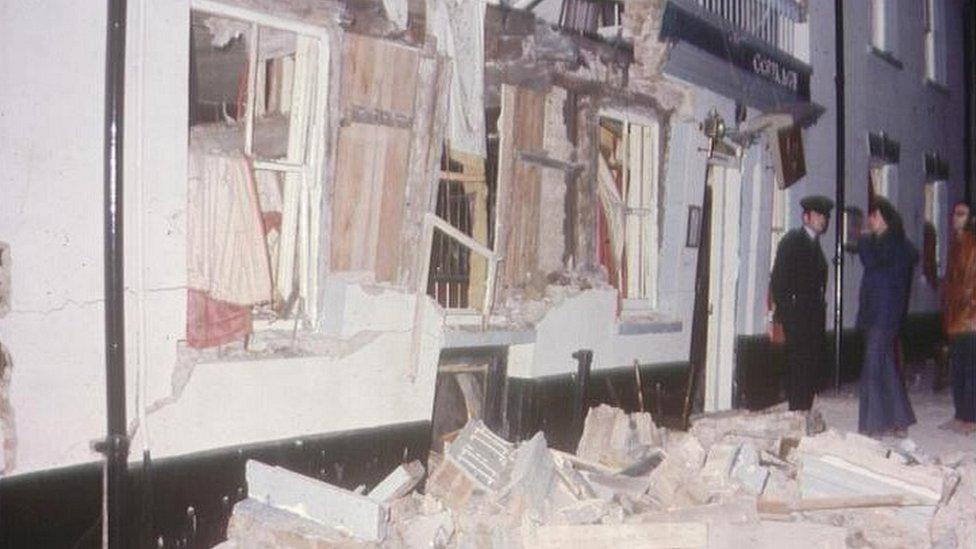
- Published28 June 2022
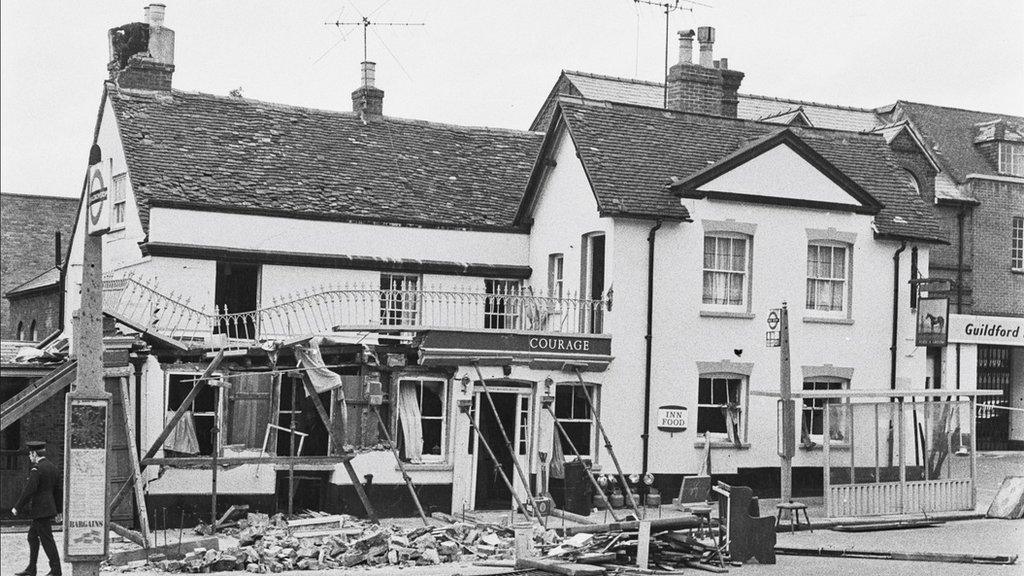
- Published27 June 2022
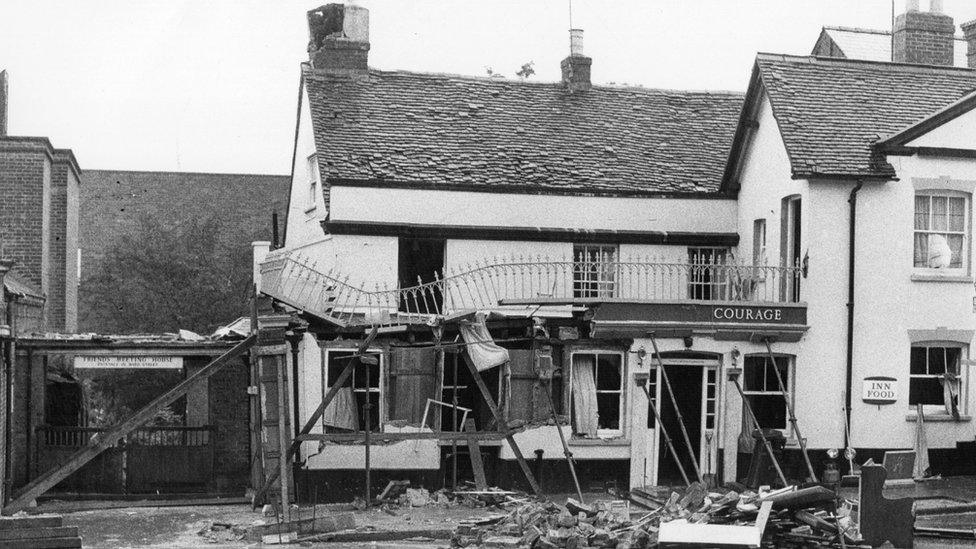
- Published21 June 2022
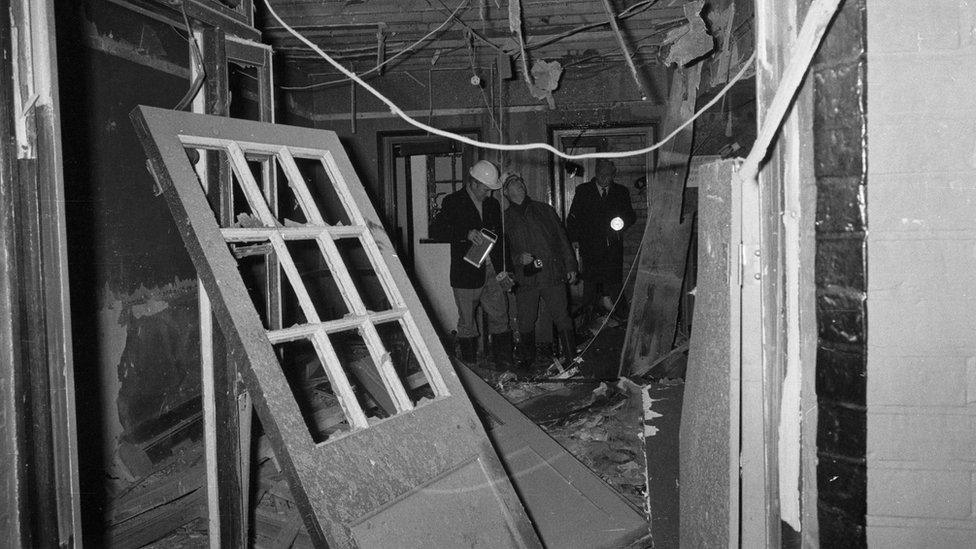
- Published20 June 2022
